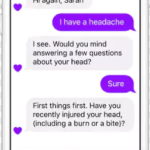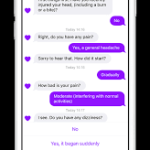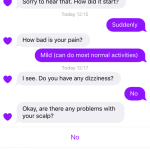
WHY THIS MATTERS IN BRIEF
For better or worse, more and more healthcare services are being augmented and automated using new artificial intelligence services, only time will tell what the results will be.
A few months ago Baidu rolled out a limited trial of a new virtual doctors service, in the form of an artificial intelligence (AI) chatbot, to some of its members. Now, in the largest roll out of its kind officials at the UK’s National Health Service (NHS) are going to replace human operators with an equivalent AI chat or and trial it on over 1.2 million Londoners who use the NHS’ free 111 out of hours doctor on call service in order to ease pressures on the health services’ Accident & Emergency service.
The trial, which will run for six months in the depths of winter, is part of a national drive by UK health officials to digitise the NHS and speed up help for minor complaints to reduce strain on services, and the company behind the scheme, Babylon Health, said it will help save the health service a “substantial” amount of money and time.
The trial will be launched across north London, starting in Barnet, Camden, Enfield, Haringey and Islington, and when patients dial 111, they will be prompted to try the app. Instead of describing their ailments over the telephone, users will type in the symptoms via a series of texts, leaving the “chatbot” to decide how urgent the situation is, and recommend the right help.
Patients could be told to make an appointment with their GP, or be told to go to Accident & Emergency if urgent problems are detected.
Despite the alleged benefits though leading doctors and patients’ groups have expressed fear that the experiment, due to start later this month, is too risky. They raised fears that the new AI could miss serious conditions – or casualty units end up swamped.
“I find this quite frightening. People who are ill want a person they can speak to. Typing in your own symptoms and waiting for a result is just ridiculous – what happens if you make a mistake?” said Joyce Robins from Patient Concern.
Dr Chaand Nagpaul, Chairman of the British Medical Association’s GP committee, said the system could add to pressures on hospitals, rather than reduce them.
“Owing to the lack of input from a trained professional, this simplistic system could, like NHS 111, result in more people being sent to overstretched GP or A&E services who don’t actually need treatment – or conversely serious conditions being missed,” he said.
Peter Walsh, Chief Executive of safety campaign group Action Against Medical Accidents, questioned who would be liable if computer error caused patient harm or death.
“The NHS 111 system has already proved prone to error – that risk could be even greater under a system like this,” he said, calling for robust evaluation of the six month scheme.
“The stakes here are very high, I would be concerned about the risks to patient safety; this needs to be very carefully evaluated because of the risks of misdiagnosis,” said Katherine Murphy from the Patients Association.
Dr Taj Hassan, President of the Royal College of Emergency Medicine, said he hoped the use of AI would be an improvement on existing 111 systems, which were sending too many patients to A&E departments.
“The important thing is that this is properly evaluated before it is rolled out,” he said.
Health officials said the pilot is one of several new tools that will be tested in coming months across the country before being rolled out more widely. The scheme is part of a NHS modernisation program, where GP appointments and prescriptions will be booked online and the national NHS Choices website used to direct patients to the care they need.
Adam Duncan, chief operating officer of London Central and West Urgent Care Collaborative, which will test the scheme, said: “We aim to provide an alternative to using the NHS 111 telephone number for service users that would find it most convenient to their lifestyle.
“The use of the app could also reduce the demand on NHS 111 during the most busy periods, whilst retaining the high quality and accessible service.”
Health officials stressed that the scheme is not intended to replace the 111 phone service.




















[…] Original Post: https://www.fanaticalfuturist.com/2017/01/new-nhs-artificial-intelligence-doctor-hits-the-front-line-to-… […]